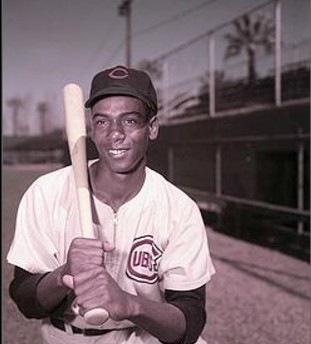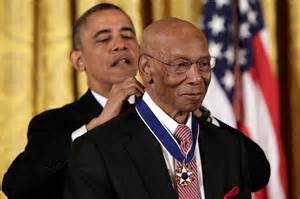Remembering “Mr. Cub” Ernie Banks

“Mr. Cub” Ernie Banks has passed away at the age of 83.
The baseball world lost a legend with the passing Friday of Hall of Famer Ernie Banks at the age of 83.
Though “Mr. Cub” was most associated with the team for which he played his entire 19 year career, for fans outside of Chicago he is likely best remembered for his famous line “Let’s play two”, which epitomized his love for the game and acceptance as one of the superstars of the first full decade in which African-Americans played in the major leagues.
Since it has been 44 years since his retirement and 56 years since he was the dominant player, and back-to-back MVP winner, in baseball, it is easy to forget just how great a player Banks was.
After a stint in the U.S. Army and time with the Kansas City Monarchs of the Negro American League, his contract was sold to the Chicago Cubs in 1953 and he made his major league debut late that season. The lanky 6-foot-1, 180 pound shortstop moved into Wrigley Field for good in 1954. He finished second to Wally Moon (Hank Aaron was fourth) in the Rookie of the Year voting as he hit .275 with 19 home runs and 79 RBI.
Many like to point to Cal Ripken Jr. as the pioneer of the power hitting shortstops, but Banks was blasting long balls while anchoring the Chicago infield three decades before Ripken entered the league. He blasted 44 home runs in 1955 to set a new record for shortstops in a season, but eclipsed that mark in 1958 when he led the league with 47 home runs and 129 RBI to win his first MVP award.
He followed that up with another monster year in 1959 (45 HR, 143 RBI) to win his second straight MVP award. In 1960 he claimed his second home run title as he hit 41 home runs with 117 RBI. He also won the Gold Glove award for his fielding prowess at shortstop.
Though Banks was just 29 and would play for another decade, he would never again reach such illustrious power numbers.
During the 1961 season, Banks had knee issues that started to limit his mobility at shortstop and he saw some action in leftfield and at first base. In 1962, at the age of 31, he moved permanently to first base. Even though he spent only eight full seasons as a shortstop, his 277 home runs during that time are still the most ever for a National League shortstop.
Despite Banks greatness, he spent most of his career on a team that struggled to contend. The Cubs didn’t win more than 74 games in a season from 1953-1962. They finally had a winning record (82-80) in 1963, which ironically was the worst statistical season of his career as Banks played in only 130 games and hit .227 with 18 home runs and 64 RBI.
He bounced back to provide the Cubs with a solid power-hitting first baseman for the remainder of the decade, but it wasn’t until 1967, under the guidance of Hall of Fame manager Leo Durocher, when the Cubs won 87 games and finished third in the NL that they were legitimate contenders.
The 36-year-old Banks hit 23 home runs and drove home 95 runs that season and in 1968 he had the seventh 30+ home run season of his career as he hit 32 long-balls to help the Cubs win 84 games.
In 1969 the Cubs looked poised to finally make the postseason and the 38-year-old Banks was a key contributor. He earned the 11th All-Star selection of his career while hitting 23 home runs and knocking in 106 runs.
The Cubs took over first place in the NL East in early April and led the division by as many as nine games in mid-August. However, they combination of late-season struggles and a late surge by the New York Mets doomed the Cubs and denied Banks a shot at the playoffs. They went 10-18 over the final month of the season to finish eight games behind the eventual World Series Champion Mets.
Banks played in 111 games over the next two seasons, but his highlight was on May 12, 1970 when he became the 8th player in Major league baseball history to reach the 500 home run plateau.
He retired in 1971 after 19 seasons and 2,528 career games (the most in league history without appearing in a postseason game). His 512 career home runs still are tied with Eddie Mathews for 22nd place on the all-time list. His 1,636 career RBI are 29th all-time.
Banks was elected to the Baseball Hall of Fame in his first year of eligibility in 1977. He continued to be a favorite of Chicago Cubs fans throughout the rest of his life. In 1999 he was named to the All-Century Team and in 2013 received the Presidential Medal of Freedom.
We send thoughts and prayers to his family and join with baseball fans around the country in remembering his effervescent love for the game and incredible career.





Before you can truly settle down, you must earn an educational degree first. This is needed to become more striking to employers and earn a decent salary. Apart from that, you will be deemed as a useful member of the community.